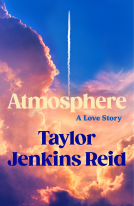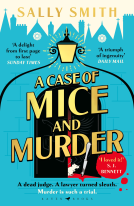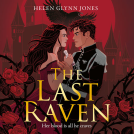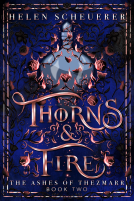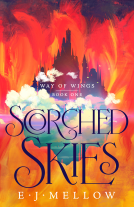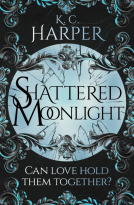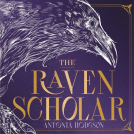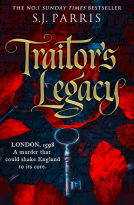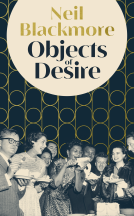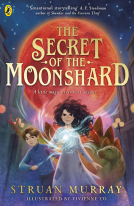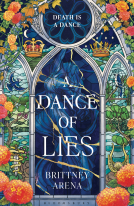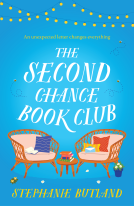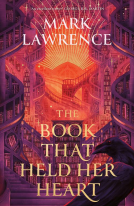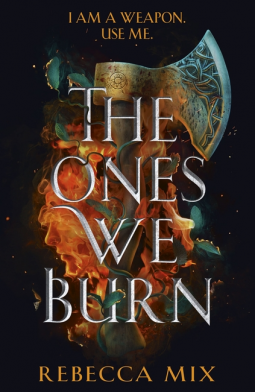
The Ones We Burn
the New York Times bestselling dark epic young adult fantasy
by Rebecca Mix
This title was previously available on NetGalley and is now archived.
Send NetGalley books directly to your Kindle or Kindle app
1
To read on a Kindle or Kindle app, please add kindle@netgalley.com as an approved email address to receive files in your Amazon account. Click here for step-by-step instructions.
2
Also find your Kindle email address within your Amazon account, and enter it here.
Pub Date 8 Nov 2022 | Archive Date 18 Nov 2022
Hodder & Stoughton | Hodderscape
Talking about this book? Use #TheOnesWeBurn #NetGalley. More hashtag tips!
Description
'Feral and tender' Chloe Gong
I am the monster. I am the shield. I am the knife in the dark.
** A NEW YORK TIMES BESTSELLER **
Ranka is tired of death. All she wants now is to be left alone, living out her days in Witchik's wild north with the coven that raised her, attempting to forget the horrors of her past. But when she is named Bloodwinn, the next treaty bride to the human kingdom of Isodal, her coven sends her south with a single directive: kill him. Easy enough, for a blood-witch whose magic compels her to kill.
Except the prince is gentle, kind, and terrified of her. He doesn't want to marry Ranka; he doesn't want to be king at all. And it's his sister - the wickedly smart, infuriatingly beautiful Princess Aramis - who seems to be real threat.
But when witches start turning up dead, murdered by a mysterious, magical plague, Aramis makes Ranka an offer: help her develop a cure, and in return, she'll teach Ranka to contain her deadly magic. But as the coup draws nearer and the plague spreads, Ranka is forced to question everything she thought she knew about her power, her past, and who she's meant to fight for. Soon, she will have choose between the coven that raised her - and the princess who sees beyond the monster they shaped her to be. But as the bodies pile up, a monster may be exactly what they need.
PRAISE FOR THE ONES WE BURN
'One of the freshest YA fantasies I've read in years' Natasha Ngan
'Romantic, brutal, and hopeful' Hannah Whitten
'I love this book. Rebecca Mix is a writer to watch' Adrienne Tooley
'As beautiful as it is fierce' Adalyn Grace
Available Editions
| EDITION | Other Format |
| ISBN | 9781399706216 |
| PRICE | £16.99 (GBP) |
| PAGES | 480 |
Featured Reviews
A wonderful witchy powerful story! Magical beyond words. I devoured this book and it stayed with me for days, I highly recommend it!
The Ones We Burn is a book that completely blew me away. It’s raw, cruel and heartbreaking, it deals with abuse, grief, and a pain that scars deeply… but it’s also full of a hope, and of a love that is uncorrupted and real.
In the world Rebecca Mix perfectly crafted, the frail alliance between humans and witches is secured by a treaty: the strongest blood witch, charged with the title of Blodwinn, is chosen to marry the Sunra’s heir and become queen. The Ones We Burn tells the story of Ranka, a young witch and latest Bloodwinn, from the moment she is forced to leave her coven in the North and journey to Seasweapt, capital of the human kingdom, to marry Galen Sunra… and to kill him, as part of a coup planned by her coven’s leader.
But Ranka gets surprised when she discovers that Galen is not a cruel leader, like his father, but a gentle prince, and his twin, Aramis, is brilliant and extremely attractive. Walking on the fine line that separates villains and heroes, Ranka will be forced to examine all her beliefs in a journey that could change everything, or doom the whole world.
Even though the main plot is always gripping and left you curious to solve the mystery of the witch-killing plague, with brilliant plot twists that are always surprising but also perfectly fits with the rest of the narrative, The Ones We Burn is, at its core, a character-driven story: told from Ranka’s point of view, it’s sustained by all the four main characters equally (Percy is definitely my favorite, and I’m sure many will adore him as well), and as a matter of fact the plot itself is something deeply connected with the characters, not just a series of events they live through. And there is something extraordinary in the way, with a perfect balance of adorable (and quieter) scenes between Ranka, Aramis, Galen and Percy, and more active ones that move the story forward, this book is ultimately the story of how these four grown-up kids found a safe place in each other among the madness of their lives. It’s found family dynamic at its best, truly.
The characters’ development is executed remarkably well, considering the limited space of a stand-alone, with complex and stunning evolution arcs, especially Ranka’s (if you loved Zuko’s arc in ATLA, be assured you are going to adore hers as well), that is extremely realistic in not being completely straightforward, and instead interrupted by many wrong decisions and mistakes. But there is something moving in seeing how Ranka literally blossoms from the moment she starts to hang out with Percy and the twins, even when they are still her enemies (at least in name), because for the first time she got to be with people who didn’t fear her because of her blood magic or saw her only as a weapon to be used, but whom at least were able to “friendly” tolerate her.
However, the thing in which Rebecca has completely outdone herself is the relationship between Ranka and Aramis, and how it slowly evolved from hate and diffidence, to mutual respect, to something that clearly reminds of love. But nothing is too easy in this book, and the connection that bonds them is way more complicated and fascinating than this.
The Ones We Burn is able to be fun and cute at times, but also deep and heartbreaking in portraying how abuse often comes from the people one loves the most, and the immense strength it takes to shape ourselves into something different, something better than what others raised one to become. And at the center of it all, is the concept that healing is not an easy process, and definitely one that should be undertaken only for oneself, not for anyone else.
There is a part of Rebecca intertwined between every line, and that’s one of the reasons why this book is so special. She is truly a talented writer, with a prose full of highlighting-worthy quotes, and you should definitely keep her on your radar.
I recommend The Ones We Burn to readers looking for a unique fantasy with charming characters, and who don’t mind crying at least a couple of times… and I’m going to sob over that beautiful epilogue and make peace with the fact that I will have to say goodbye to my favorite dorks 😭
 Bookseller 1005679
Bookseller 1005679
I’m going to preface this review by saying my take on this book is one reader’s opinion. I am a Black, disabled YA author who is not comfortable posting this from my author account given the way other BIPOC authors were harassed solely for following Mix or saying they were looking forward to this story.
Before I address the actual contents of the story, I do want to be blunt – from what I can tell, the controversy drummed up online is based on nothing, led largely by either anonymous accounts, or people who are known to try to build platforms by grifting off of outrage culture. I was wondering why nearly a month later the only reviews that were getting passed around as evidence that this book was some kind of white supremacist dog whistle had either no textual evidence, or a single out of context line.
I have my answer now: it’s because there is none.
There are going to be light spoilers below but I believe they are necessary given the way public conversation around this book has unfolded.
The Ones We Burn follows the story of Ranka, a seventeen year old blood-witch, who grows up among other witches in a politically disorganized country engaged in border conflict over resource extraction with a larger port country. A treaty has been established that relies on the Bloodwinn (Ranka) to marry the human heir (Galen, the Black prince) to renew a treaty they’ve had for three generations. Ranka is sent to start a coup against this kingdom when her plans are quickly waylaid by the emergence of a strange plague that turns ordinary witches into zombie-ified monsters. Much of this book follows Ranka, Aramis, Galen, and Percy as they try to find a cure for this plague and stave off the coming political collapse of their countries.
When we meet Ranka she’s fully under the influence of one of the political factions the Skra witches, and is particularly under the thumb of their leader, Ongrum, who Ranka clearly views as her mother by adoption if not by blood. A word of warning: if you are a survivor of abuse, some of the dynamics in this book may be difficult for you, and while I cannot presume to know Mix’s personal life, the dynamics between both Ranka and her leader have the rawness of someone who knows exactly what they’re writing about. The dedication is also written to “the kids who survived”, so infer from that what you will.
Ranka’s perception of the world wildly contrasts with the text’s portrayal of it. She is a morally gray, unreliable narrator who essentially has her ass handed to her for 480 pages in a way that is simultaneously satisfying and heart wrenching. The assertion that Ranka is somehow oppressed is just not textually accurate, given that this book spends far more time punishing and condemning Ranka than being kind to her. Despite her being the protagonist, the narrative makes us root against Ranka because we know if she gets what she wants, ultimately, she will suffer. She is abused, brutalized, humiliated, and when she makes mistakes, characters do not forgive her, and she does not expect them to. At least a third of this novel is Ranka essentially expecting to die and knowing she is not owed reconciliation with characters she has betrayed. The general message here seems to be that you are not responsible for the wounds you suffered, but you’re responsible for healing them so you don’t enact further suffering on others.
Much of the concern about this book seems to be from an anonymous review and a tweet claiming this book was about a nation of Brown and Black people oppressing the white witches. This is a factually inaccurate claim, given neither country is racially homogenous. Both groups are repeatedly canonized as being multi-racial. Some may be concerned that this is an anti-hero narrative that places a white character against Black characters. But while Ranka initially views Aramis and Galen, the Black teenagers, as her political enemies, it’s essential to note the text does not. Ranka’s first interaction with Galen is a scene where she meets him at dinner and is baffled that the wellbeing of the palace staff is his first priority. The staff adore him, the guards adore him, and even before either of the Black teens are on-page, there is some very clear signaling from Mix that the text is already aligned against Ranka’s interests to favor the twins, and that the reader should be, too. Mix spends 500 pages fleshing out three-dimensional arcs around Galen and Aramis coming into their power as heirs over a struggling nation, and while they do make mistakes, at no point are they portrayed villains or antagonists. In every scene, in every chapter, even when they make complicated choices, they are clearly the protagonists against Ranka’s messier, albeit more frustrating anti-hero arc.
It's also important to note that while Aramis and Galen are royalty, the resources of the country are almost out entirely of their hands. They have no access to wealth, their military, or even control over public policy. Much of the book is building up to Galen’s eighteenth birthday when he will presumably take the throne and have be granted full governing power. This book starts four months prior, with Galen still underage and at the whims of a Council that has been (very poorly) ruling as a type of managerial regent. There are multiple references to laws being passed without Galen being allowed to read them, and white guardians and political leaders have seized the reins in the absence of their parent’s death. Much of the witch’s resentment in the novel seems to have intensified in recent years following the death of Aramis and Galen’s parents – implying things were relatively peaceful before the Queen and King passed, with one of the major sources of civil unrest being a recent event we later learn was Ranka’s fault. The political positioning in this story is surprisingly well done, and the political nightmare Galen has inherited reminds me of what happens with Black politicians are elected to lead largely white establishments and are unable to enact actual change but are still the public face of failure and inaction.
A second note I want to make is the treatment of the lead Black teens in what is regularly a very violent narrative. While the story does often veer into violence and gore, the narrative’s treatment of Aramis and Galen seems intentionally gentle. Mix is extremely careful to treat the lead characters of color with care in scenes where others are getting grievously injured. Ranka and the other witches who are canonized white are regularly stabbed, set on fire, medically experimented upon, and even thrown from cliffs. While Aramis and Galen are often put in harms way, the narrative is very protective of them and refuses to linger on their pain in a way it often does with Ranka and other white characters. I’m uncertain if there’s a single scene in this book where Galen is actually injured. Even in a chapter where Ranka, Percy, and Aramis have been poisoned, Mix lingers far more on Ranka and Percy’s physical pain than that of Aramis despite the narrative’s concern for Aramis’ wellbeing above all else. This careful refusal to linger on the pain of the Black teenagers meant a lot to me as someone who is used to bracing myself for trauma porn when Black and Brown bodies appear on screen, and it’s done in a way that never feels untrue to the text. While both the covens and the human kingdom are mixed race, I noticed repeatedly that bystanders who enact or suffer horrific violence (there is a particularly hard to stomach scene where a young girl is burned alive) are white. The white characters, including Ranka, are the ones either condemned by the narrative as villains or as victims of horrific violence at the hands of other white characters. This happens frequently enough that it cannot be an accident, and it seems particularly relevant given the way dialogue around this book evolved.
Like another reviewer has noted, I appreciate that this novel seems painfully conscious of the way Black characters are treated in popular media, and the efforts it takes to avoid them. Even when Aramis is sharp with Ranka, the narrative is clearly on her side. Galen’s most defining feature is that he is gentle and kind-hearted, and his biggest “flaw” is that he’s not interested in compromising his personal morals if that’s what it takes to become king. The other characters of color in this story are largely the heroes – I particularly enjoyed the non-binary witch who leads a rival coven who emerges later in the story – or are written as people going about their normal lives.
It is worth nothing that I don't believe this story was really meant to be read through a racial lens at all. Much of the power struggles in this book seem to be an allegory for class and the way people who are queer or disabled are ostracized. I'm concerned the discourse will cause largely white readers to project things onto this book that for me, as a Black author, simply are not there. Similarly, I’ve found it interesting that some reviewers read Aramis and Galen’s father, the King who was known to be a complicated ruler both beloved by his people and feared for his storm magic, as Black – I believe he was meant to be read as white. There are a few places in the book where the novel references the late Queen having brown skin and the late King being pale, but they’re very easy to miss. Regardless, I find it interesting some have read the complicated King as Black and their more affectionately remembered mother as white.
Though I found one of the lead villains uncompelling, I understand why they made the decisions they did. I will say this is something Mix excels at: many of the people in this book make terrible decisions, and, unfortunately, you typically understand why. There are characters in this story who make some of the most terrible choices conceivable but it never feels out of character and it makes the general crux of this narrative, that of being a child of extremely manipulative adults, all the more fully realized and painful.
Most of the stumbling points for the novel for me have to do with YA Fantasy generally not being to my particular taste and the general heft of this story packed into a standalone. This is also a very gruesome book and my tastes do not usually veer towards the kinds of body horror Mix seems to have an odd love for. I was more interested in the worldbuilding in regards to the witches than the political infighting and plague plotline most of the novel was built around. Some of the characters are clearly written for a teenage audience. Percy in particular will likely be grating to adults but entertaining for the actual children Mix is writing for.
Overall, I found this to be a promising debut written with a lot of heart and care. This text is going to be very important to survivors of abuse, particularly the children Mix is writing for, and I have to hope that this book finds it’s audience regardless of the controversy clearly designed to kneecap a young author’s career before it can begin.
For nearly five hundred pages, it feels like throughout what seems to be a very carefully written text, Mix’s dedication carries through to establish a single message for her young readers: regardless of your race, regardless of your class, if the parental figures in this book remind you of your own, you deserve to know the way you were treated was abuse, and it wasn’t your fault.
THIS MAGIC SYSTEM IS INSANE!! Magic that craves death is a really interesting idea and I adore it. Ranka is called a blood witch, but her magic is not blood related and is in fact solely based on her magic craving death.
If you’re into ya fantasy this is definitely a great read, the plot was incredibly interesting and very well written. There were plot twists I didn’t predict while reading, but once they happened I remembered the subtle hints in the previous chapters. The characters had amazing arcs, we had huge growth from our main character, Ranka, in particular. She learnt to trust herself and be who she wants to be, not the weapon she was forced to become. We had the twins who were such polar opposites that I loved their characters as individuals, and as a dynamic duo. We have Galen who is more shy and reserved, and Aramis who is a smart, funny, all-round badass. And Percy who I think is literally my favourite because he is hilarious, but also has a heart of gold.
I adored the slow burn romance in this, and the theme of trauma, suppressing trauma and eventually facing your trauma was something that really stuck with me. As someone who has experienced trauma, I really related to the characters struggles and the difficulty overcoming her trauma, it was slow, it took time, and it was written perfectly. It hit hard, and was very accurately represented in this book.
Another theme of this novel that was tackled superbly is abuse. What do you do when the people who are supposed to love you, care for you, and protect you, are the ones who hurt you just to further their own ambitions? What do you do when everything you’ve ever been taught was a lie to weaponise you and the person you were taught to hate, is in fact, innocent? My heart hurts.
Rebecca Mix’s debut is absolutely everything I love in a ya fantasy read and I cannot wait to read more from her.
 Reviewer 830150
Reviewer 830150
I don't normally read fantasy, but the reason I requested this ARC is so I could review a book that I had actually read - unlike most of the reviews that have been logged so far on Goodreads.
I think it comes as no surprise that the book does not contain any of the racist/antisemitic elements that someone successfully started a smear campaign about. It is actually staggering how many people mindlessly followed that first accusation without checking for themselves. And in doing so, drove an excited young author away from the internet.
I hope this doesn't come across as rude, but Rebecca Mix isn't exactly an established name in writing (yet). She's had a couple of threads go viral, and they have been very funny, and I would wager that this is how most people became aware of her. Someone quite clearly took umbrage and decided that they would try and ruin her writing career before it starts, and the Goodreads rating very quickly dropped from 4.65 to 3.15 with no sign of recovering, from all the people who made a Goodreads account only so they could one-star this book and perpetuate the accusations.
The situation that the accuser has made up is so blatantly NOT present in the book, all it would take for people to verify these claims would be reading the first ten pages. Instead, we've had users withdraw their previous praise, all because someone made up a racist undertone to the book and they have just taken that as a fact instead of reflecting on their own reading experience. I read a couple of other books fairly recently which mentioned blood magic. Neither was targeted to this extent, or at all, which really drives the point home that this is a personal attack on this particular author. Shockingly, if people have to go back and edit their reviews because they "hadn't realised" that something was racist, chances are it wasn't racist in the first place.
Yes there is an oppressor and an oppressed group in this book - but neither is entirely white or entirely Black. Race isn't what divides the characters in this book and the main conflict and power dynamic is between humans and witches, both of which span several races and genders. Which is made clear from, like, chapter 1.
It is a good story - if a little long - told from the point of view of Ranka, who is the only living blood witch of her generation and therefore must be married to the human prince as established by a peace treaty. There are 4 central characters, all teenagers, with fairly distinct voices which is often easier to achieve in 3rd person narration, and the prose flows really well in spite of being repetitive at times (which I think is by choice for once, as opposed to sloppy editing).
This book is one big allegory for being brought up by a narcissistic parent (or several authority figures in the case of Ranka), yes it's a little heavy handed at times and feels like it's regurgitating instagram infographics about childhood trauma *but* I also appreciate that writing this must have been cathartic for the author as she was processing her own abuse through her characters.
I would have rated this 4 stars if I was rating it in a vacuum, but I am rating it 5 to counteract all of the fake reviews from people who haven't read a single word of it.
With thanks to Hodder&Stoughton and Netgalley UK for the e-ARC of this book.
 Hayley M, Bookseller
Hayley M, Bookseller
Honestly, to say this was overwhelmingly good would be an understatement. My high hopes were lifted with each banter-filled, action-packed page.
First of all, I LOVED Ranka. That girl needs a hug and a touch of therapy, but I love her.
Aramis and Galen were the icing on an already amazing, queer cake, and Percy was the pinecone on top.
Rebecca's writing is simply divine, the dialogue is natural, funny and sharp, and while this is a dark novel at times, with themes of abuse, death (and the plague!) it never feels too dark. Ultimately, this is a book about survival, love, found family, and learning to love yourself. It's romantic, and sweet, and brutal and hopeful.
recieved this book as both pdf and audio as part of an advanced reader group in return for a honest review.
I was at frist drawn into the cover art. It was soo eye catching the powerful Great axe and around it the furry of fire.
The words just above the title
" I am the Weapon. Use me "
Together it was like a sirens call. I needed to know who or what they burned .Who was this weapon that was spoken of?
It turned out the ones they burned were witches. Children born with magic in their veins.
.
One such child was Ranka . Her magic was different from that of others it demanded sacrifice , it demanded a life. Ranka was a blood witch.
After her magic destroyed her life with her sister , she was found by the leader of Skra.
The old witch took her, claimed her for the coven and told her she would be strong and she would be powerful.
Her adoptive family the Skra coven took her and taught her to use her magic for the good of the coven.
Then she was named Bloodwinn. The plan was simple she would go to the Prince as part of the treaty between the Witches and non magic peoples and when her blood magic built within her she would kill the prince and her adoptive people as well as others would cease power and reclaim their lands . No more burning.
It seemed simple.
As a debut novel this is breath taking and utterly sensational. It was slightly slow to start but once it did...I couldn't put it down I had to know what was going to happen next. I had to know if Ranka survived.
Pure epic story telling. I expect we will be seeing great things from this talented wordsmith.
The One We Burn is a sensational debut book about young blood witch name Ranka who tried to ended treaty with pretending to doing her duties to married human prince. The premise is interesting expecially when our FMC finally learned the real truth from peoples she thought as her mortal enemies. I like how author trying to provide diversity in characters expecially at the court. The pace is slower than my usually but still enjoyable and suitable with Ranka's narration. Ranka suffered since young age and badly traumatized. I feel sympathy, understand her angsty, and appreciate saw her character growing in whole story.
The writing style is smooth and easy to understand. Author can fleshed out her characters and delivered her story. I think need extra work on world building development because right now the book only scratches the surface all the potential. I enjoyed the banter between character, and wishes extra chemistry on the romance side.
Overall this isnt perfect but a solid enjoyable read from debut book. Halloween is near and I am glad got my hand on this book full of dark magic and bloody badass witches.
Thank you Hodder & Stoughton (Audio) and Netgalley for provided my copy. Really appreciate and my thoughts are my own
Once I started in this book, I found myself dragged along with the story. I really enjoyed reading about Ranka, she wasn't a hero, she wasn't a villain. She was something in between and that made it even more interesting. The line between good and bad is so thin and this book explored that very beautifully.
Normally I don't always like reading about witches, but this book was different. The storyline was strong, the characters were interesting and the worldbuilding was great. There was enough depth to challenge the reader, but it wasn't really difficult either. Some elements, like the friendships and love interests were predictable from time to time, but the story contained a lot of surprising and unpredictable turns that made the book very interesting, fun and exciting to read.
The exploration of the different characters was amazing, even though the story is only told through Ranka. You can see other characters grow, they make mistakes and learn from it. But especially Ranka. Her journey, the things she goes through, the things she leaves behind and the new experiences are truely beautiful, haunting and feel very realistic.
The Ones We Burn is an incredible debut. Rebecca Mix has a writing style that completely drew me in. The plot was exciting, unique and the characters were good, although not as fleshed out as I would have liked. Overall, if you are looking for a fast paced fantasy, I highly recommend this book.
⭐️⭐️⭐️⭐️⭐️ / 5 stars
The Ones We Burn is a story about Ranka, a blood-witch, sent as a bride to the human prince to honor the treaty.
“The family you choose are the ones who leave the deepest mark.”
I love a good story about witches, and loved every minute of reading this one! I dove into this story and had such a hard time putting it down!
The writing and plot were basic, but so good! It has the typical fantasy tropes and characters, but so much lore and worldbuilding was put into this world! The different types of covens, witches, powers and the humans made the world feel wholesome and big. I loved getting to know the world.
The plot was very good as well. Ranka going under the guise of marrying Galen and killing him to save the problem of suppression of the witches. It is something I’ve seen before, but the execution was done so well. The political unrest, the plague killing witches and the tensions were written so well. I just wanted to keep on reading to find out what would happen next.
The characters were really well developed and I loved them. They are noticeably teenagers and often act without thinking, but I loved the development and growth they went through. Ranka especially grew so much. I loved how she went from blindly following to really standing up for herself and becoming confident in who she is (she really reminded me of Zuko so much). I also really liked how kind-hearted and gentle Galen was. Percy was just so funny and Aramis really stole my heart.
I loved the found family aspect of this book so much! While Galen, Aramis and Percy were a bit established already, Ranka fitted in perfectly. They found a safe place in each other while trying to solve the problems kids shouldn’t have to deal with. I also really loved the little bits of romance that lifted the book to a higher level for me. it developed from “hate” to mutual respect and them needing each other to love.
Overall, The Ones We Burn is a great story with a full plot and story, fun, humor, heartbreak and mind-blowing moment.

